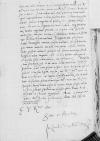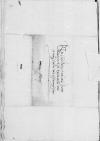1539-01-28⌊Vigesima octava elapsi mensis Ianuarii1539-01-28⌋ per equos dispositos incolumis, verum admodum defatigatus, ex ⌊Hispaniis⌋ redii et cum primum adeo longinqua exhausta profectione me ad quietem aliquantisper componerem, corripuit me senectutis comes infesta podagra et oculorum dolor pertinacissimus, quibus tamen premente necessitate neglectis subito compulsus sum per currus celeres, quos Gotsthi vocant, ad serenissimum dominum ⌊regem Ioannem⌋ ⌊Budam⌋ festinare. Rursus huc iam reversus plane necesse habeo ⌊Frankuordiam⌋ versus die crastina omnino recedere, siquidem eo ad diem vigesimum praesentis mensis et marchio Ioachimus Brandenburgensis Palatinus et Ioannes Fridericus Saxoniae dux, electores item landtgravius ⌊Hessiae⌋ aliique plures ⌊Germaniae⌋ principes convenient, quo et me necesse erit absque mora constitui. Videat igitur et iudicet Reverendissima Dominatio Vestra, quam graves et assidui sint labores mei, quos quidem pro Republica Christiana tantum abest ut subterfugiam, ut ne mori recusem, modo inde vel minimum fructus in nos redundet.
Accepi litteras novissimas Reverendissimae Dominationis Vestrae amoris erga me et benevolentiae suae plenas, et sane quod de nostra conversatione ⌊Wratislaviae⌋ meminit, ego me eo nomine multo feliciorem existimo et spero, quod adhuc denuo coniungemur. Interim vero non obmissurus sum de iis, que ⌊Frankuordiae⌋ agentur,
 UUB, H. 154, f. 1v
Reverendissimam Dominationem Vestram diligenter admonere.
UUB, H. 154, f. 1v
Reverendissimam Dominationem Vestram diligenter admonere.
Destinatus sum rursur generalis orator praesentae ⌊sacratissimae caesareae maiestatis⌋ et per ⌊Germaniam⌋ et ⌊Hungariam⌋ uti prius, sed tamen propter graviora negotia crebrius mihi in imperio quam in hac ⌊Romanorum etc. regiae maiestatis⌋ aula versandum erit. Si quid igitur ad me scribendum duxerit, opera ⌊Fuggarorum⌋ ad me mittat, nulla enim commodior erit mittendi ratio.
Apud ⌊sacratissimam caesaream maiestatem⌋ multa dixi in commendationem summam Reverendissimae Dominationis Vestrae, sed maiestas sua caesarea tam dignam tamque clementem eius habuit memoriam, ut illam designarit inter cardinales creandos, si igitur animus est Reverendissimae Dominationis Vestrae ad hoc fastigium assurgere, admoneat me per litteras, ⌊maiestas enim caesarea⌋ omnia ea facere clementer curabit, quae pro ornamento dignitatis et amplitudinis Reverendissimae Dominationis Vestrae esse videbuntur.
Itidem et ⌊magnificus dominus de Grantvella⌋ rogavit me plurimum, ut se continuis litteris Reverendissimae Dominationi Vestrae commendarem obferens similiter strenuam suam et promptam in rebus eiusdem promovendis operam.
⌊Vallisoleti⌋ venit ad me una cum ⌊marito⌋ et ⌊matre⌋ honestissima illa ⌊Ioanna Dantisca de Curiis⌋, Dominationi Vestrae Reverendissimae notissima, quae, ubi cognovit coniunctionem arctissimam inter me et Reverendissimam Dominationem Vestram intercedere, una cum dictis marito et matre enixe me rogavit, ut se Reverendissimae Dominationi Vestrae affectuosius commendarem efficeremque, ut cum non  UUB, H. 154, f. 2r habeant, unde commode et cum decore aliquo vivant, quo Reverendissima Dominatio Vestra tam marito quam praedictae ⌊Ioannae Dantiscae⌋ succurreret. Idem autem ⌊maritus⌋ secretarii locum habet apud ⌊imperatricem⌋, talem quidem, unde se solum vix possit alere.
UUB, H. 154, f. 2r habeant, unde commode et cum decore aliquo vivant, quo Reverendissima Dominatio Vestra tam marito quam praedictae ⌊Ioannae Dantiscae⌋ succurreret. Idem autem ⌊maritus⌋ secretarii locum habet apud ⌊imperatricem⌋, talem quidem, unde se solum vix possit alere.
Quare, rogatus et quidem mea sponte, obnixe rogo, ut eorum dignam rationem habeat, neque patiatur eos tanta egestate premi et, si quid velit ipsis adiumento esse aut pro eorum sustentatione mittere, id faciat meo consilio et per medium ⌊Fuggarorum⌋, quo per eos dictae ⌊Dantiscae⌋ annuus census reddatur et constituatur, quo etiam mortuo marito iam aetate confecta habeat, unde possit vivere. Alioqui enim vivens maritus, prout ⌊Hispanorum⌋ ingenium est, ab illa totum emungeret et in suos usus converteret aut absumeret.
⌊Dantisca⌋ sane formosa est et non minus culta moribus, sicut ex pictura, quae eam plane refert, licet deprehendere. Quare prorsus dignam censeo, cui Reverendissima Dominatio Vestra debeat benefacere, ne inopia compulsa vacillet aut ab instituto deflectat. Quemadmodum Dominationem Vestram Reverendissimam propter hanc intercessionem meam certe piam et honestam plane facturam confido.
Quam Dominus Deus sospitet et servet incolumem.
 UUB, H. 154, f. 1v
Reverendissimam Dominationem Vestram diligenter admonere.
UUB, H. 154, f. 1v
Reverendissimam Dominationem Vestram diligenter admonere.
 UUB, H. 154, f. 2r habeant, unde commode et cum decore aliquo vivant, quo Reverendissima Dominatio Vestra tam marito quam praedictae
UUB, H. 154, f. 2r habeant, unde commode et cum decore aliquo vivant, quo Reverendissima Dominatio Vestra tam marito quam praedictae 


